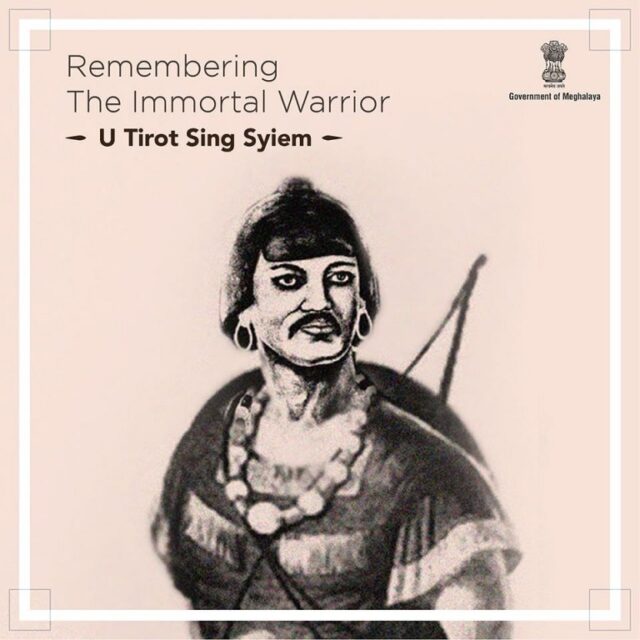
–Dr. Ankita Dutta
The story of the Indian freedom struggle in the Khasi hills of Meghalaya would remain incomplete without U Tirot Sing Syiem. The Khasi, Garo and Jaintia Hills were brought by the British under their political control in phases after their annexation was complete. There was vehement resistance from the traditional chiefs and local leaders of the region. Tirot Sing was the Syiem (Chief) of a Khasi kingdom called Nongkhlaw situated in the mid-western Khasi hills of Meghalaya. He was born in 1802 and traced his lineage from the Syiemlieh clan. He was therefore addressed as the Syiem by the common people of the hills who respected him for his fine leadership qualities.
After the first Anglo-Burmese War (1824-26) and the signing of the Treaty of Yandaboo (1826), the British Government decided to occupy the Brahmaputra to connect the two valleys of the Brahmaputra and the Surma by an all-weather road. Such a road could be constructed only through the Hima Nongkhlaw territory of the Khasis. It happened to be the fastest route to connect Assam and Sylhet with the rest of Bengal. The objective was to link the two important British headquarters – Kamrup (currently Guwahati) with Sylhet (in present-day Bangladesh). Connecting both these Valleys was of strategic importance for the British, to ensure speedy and safe movement of their troops by improving the road communication.
The political agent of the British at the North-Eastern Frontier, David Scott, requested Tirot Sing to grant them permission for the construction of this road. Scott proposed that in lieu of the permission, Tirot Sing would be given control of the duars and the check-posts which passed through Assam. They also assured him of free trade along the proposed road. Tirot Sing consented to this proposal after a two-day long consultation with his durbar, believing that it will improve connectivity in the area. After the construction of this road began, Raja Balaram Singh of Rani in present-day Assam disputed Tirot Sing’s claim over the duars. When Tirot Sing went to confront him with his troops, the British gave a cold shoulder and betrayed him at the last moment.
They were forcefully penetrating into the hills, occupying lands and imposing their own belief systems on the locals. Being the Raja, Tirot Sing strongly resented against such arbitrary actions of the foreigners. The Khasis thus decided to drive away the foreigners from the hills, which ultimately led to the Anglo-Khasi war of 1829-1833. Tirot Singh played an exemplary role in this battle. Soon, he received the news that the British were bringing in further reinforcements from Guwahati and Sylhet. He understood that they wanted to grab the entire territory lying between the Brahmaputra and the Surma Valleys.
Alarmed at the threat to his kingdom, he served a notice to the British asking them to leave Nongkhlaw immediately. But, they paid no attention to his orders. He thus declared a war against the British for their attempt to colonise the Khasi hills. It was on the night of April 4, 1829 that Tirot Sing’s forces attacked the British garrison at Nongkhlaw in which two officers were killed and a few others suffered major casualties. Tirot Sing and his army fought for four years continuously without surrendering.
He selected special bands of warriors and deployed them in secret caves in the hills to produce ammunition. They terrorized the British officers posted in the Khasi hills by conducting lethal night raids on their outposts. They also employed various locally-developed techniques of guerilla warfare. They used the knowledge of their hilly terrain to their utmost advantage. Tirot Sing’s patriotic valour could not be dampened even after he sustained a severe bullet injury. He was known for his deft organizational skills, supported by efficient spies. His immortal words – “Better to die an independent king than reign as the vassal” – infused strength and courage among his people.
In January 1833, he was captured by the British forces from his hiding spot in the hills. After a brief trial, he was deported to Dhaka. He died on July 17, 1835 at the Dhaka Central Jail. His name is immortalised at the Martyr’s Column in Shillong, along with the names of the Garo leader Pa Togan Nengminja Sangma and the Jaintia warrior U Kiang Nangbah. A life-size statue of Tirot Sing was unveiled last year on his 186th death anniversary at Madan Mot Tirot, Mairang. Tirot Sing’s death anniversary is commemorated in Meghalaya every year on July 17 (declared as a state holiday). Government of India released a postage stamp in his honour in the year 1988.
(The writer holds a PhD in Political Science and regularly writes on topics related to Assam and the Northeast).
Courtesy : VSK BHARATH















